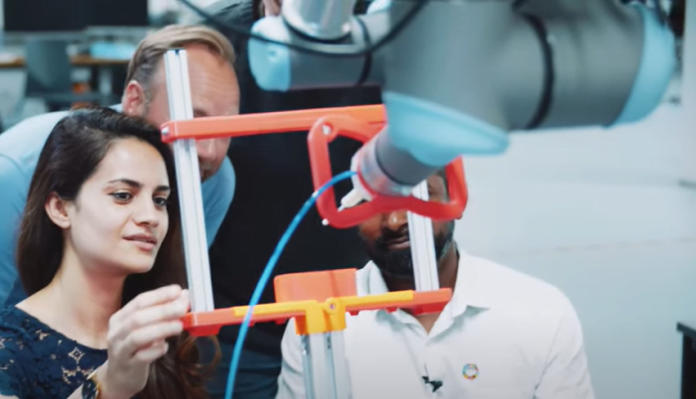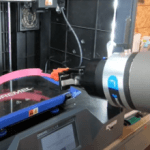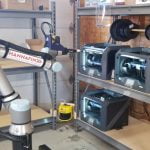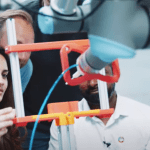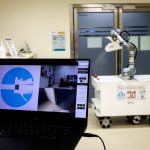Flexibility and redeployment in times of crisis.
Universal Robots Head of Southeast Asia Oceania Darrell Adams.
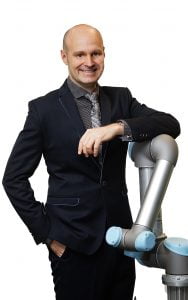
Collaborative robots, fondly known as cobots, are emerging as a force for good in the ongoing battle against COVID-19.
Whether they are disinfecting and sanitising, conducting COVID-19 tests, helping to manufacture Personal Protection Equipment (PPE) or ramping up respirator production, cobots can work alongside humans safely or on their own. They are the answer to accelerating repetitive tasks in the manufacturing environment while simultaneously addressing concerns around social distancing and the safety of employees.
Industry pioneers, Universal Robots has noted an uptake in the demand for its cobots in various industries across the globe. Locally, the pandemic has seen many companies shifting towards robotic technology to help ramp up production.
As the fastest growing sector in the robotics industry, cobots are easy to program and deploy remotely. Viewed as a ‘niche’ product in the past, cobots are now the fastest growing segment in the industrial robotics sector. By 2025, cobots are expected to jump from niche status to thoroughly mainstream, accounting for approximately 34 percent of global robot spend.
Disinfecting with cobots
The pandemic has seen massive increase in demand for effective deep cleaning and disinfection technologies that do not involve direct human contact with potentially infected areas.
In mid-April, researchers at Nanyang Technological University (NTU) in Singapore unveiled the eXtremeDisinfection roBOT (XDBOT), which comprises a UR5 cobot fitted with an electrostatic spray nozzle all mounted on a mobile platform.
Researchers programmed the cobot to mimic human hand movements so that it can get into hard-to-reach areas such as under beds and tables – a feature that has been missing from traditional disinfection robots that are not as dexterous.
These cobots are capable of running for four hours straight on a single charge and has been successfully tested in public areas on the NTU campus. The team is now preparing to trial this technology at local public hospitals.
The UR5 cobot with its built-in safety features can work safely and collaboratively with humans too.
COVID-19 testing with cobots
COVID-19 has also resulted in unprecedented demand for medical testing. In response to this extraordinary demand, Universal Robots co-founder, Esben Østergaard turned his creative energies to the design and development of the world’s first autonomous throat swabbing robot launched by Lifeline Robotics, a company he co-founded with the Maersk Mc-Kinney Moller Institute at the University of Southern Denmark (SDU).
This robot uses UR3 cobot arms fitted with a custom 3D-printed end-effector. The process is simplicity itself, beginning with the patient scanning their ID card. Right away, the robot prepares a sample kit, consisting of a container with a printed ID-label and it picks up the swab. Then, using its built-in vision system, the robot identifies the right points to swab in the patient’s throat. As soon as the swab process is complete, the bot places the sample in a jar and screws on the lid. The jar is then sent to a lab for analysis.
The process takes around seven minutes and the swab takes just 25 seconds.
Meanwhile in Houston, Texas-based portable detection manufacturer, DetectaChem unveiled a unique smartphone-based COVID-19 testing solution in late May. The company’s at-home, low cost COVID-19 test provides results via smart phone in just 15-30 minutes.
Ventilator manufacturing with cobots
Cobots inherent flexibility helps to support the rapid development and deployment of automation, a feature that really comes to the fore in times of crisis. In March, for example, the Spanish car manufacturer SEAT decided to transform one of its assembly lines from its original automotive role to ventilator production. The auto giant installed a UR10e at the end of the line to perform a quality check of the locking mechanism on the unit’s control box.
PPE production with cobots
Based in Ontario, Canada, Hannafin Automation looked to a UR5 cobot to tend the entire 3D printing cycle of face shields. The cobot picked up a Cognex vision camera to inspect the completion of each print. When print is done, the cobot picks it up, places it in a bin, and presses the printer’s touch screen to start a new cycle.
Each printer makes 25 face shields per day and these are donated to local police fire stations, paramedics, and nursing homes.
How cobots can assist locally
Adams notes that as the local economy starts to ramp up again, there is an ongoing call by government for more local manufacturing to take place. More and more, the country is looking to local, sustainable and cost-effective manufacturing practices to help reaccelerate the sector.
Sometimes overlooked, cobots seek to add value in the business and allows employees to focus on strategic tasks rather than repetitive and mundane tasks. We have seen many companies putting flexi hours into place, here, cobots can assist during the downtime and can work continuously to ensure ongoing productivity.
Universal Robots will be hosting regular webinars to help customers get started with cobots and explore automation opportunities. Local support, service and maintenance as well as training offerings through our online UR Academy, global network of Authorised Training Centres, and UR’s extensive UR+ ecosystem is also locally available.
About Universal Robots
Universal Robots was founded in 2005 to make robot technology accessible to all by developing small, user-friendly, reasonably priced, flexible collaborative robots (cobots) that are safe to work with. Since the first cobot was launched in 2008, the company has experienced considerable growth with the user-friendly cobot now sold worldwide. The company, which is a part of Teradyne Inc., is headquartered in Odense, Denmark, and has regional offices in the United States, Germany, France, Spain, Italy, UK, Czech Republic, Poland, Hungary, Romania, Russia, Turkey, China, India, Singapore, Japan, South Korea, Taiwan and Mexico. In 2018, Universal Robots had a revenue of USD 234 million. For more information, please visit www.universal-robots.com or read our blog at https://blog.universal-robots.com.
For more information contact Rene Rose, Positiv for Universal Robots Rene@positivltd.com or M +61 474 476344
Universal Robots
Australia 1800 595 243
New Zealand 800 555 214
Singapore +65 6635 7270



